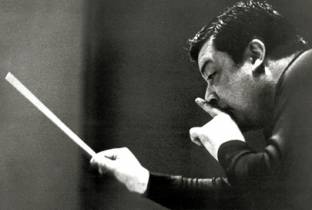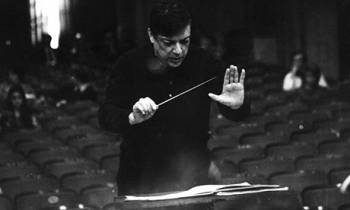
Bruno Maderna (21 April 1920 – 13 November 1973) Maderna was born in Venice. At the age of four he was taught violin in Chioggia, and his grandfather recognised the child's brilliance. He was known in Italy and abroad as "Brunetto" (Italian for Little Bruno). He continued his studies in Milan (1935), Venice (1939) and in Rome (1940), where he finally took his degree in composition and musicology at the Accademia Nazionale di Santa Cecilia. At Rome he was instructed by Alessandro Bustini, but he also took a course of instruction from Antonio Guarnieri in Siena in 1941, and he then studied composition with Gian Francesco Malipiero in Venice in 1942/43. During World War II he was drafted into the army, but soon after he voluntarily joined the antifascist Partisan Resistance. After the War, 1947–1950, he taught composition at the Venice Conservatory at the invitation of Malipiero. In those years he taught a large class which included Luigi Nono, who had previously studied law. In 1948 he met Hermann Scherchen, and Maderna and Luigi Nono both attended a course of instruction with him at Venice. Scherchen set Maderna's direction towards dodecaphonic method. He was invited to conduct at the (1951) Internationale Ferienkurse für Neue Musik in Darmstadt, where he took a founding initiative in the Internationales Kranichsteiner Kammer-Ensemble, a chamber-group which was newly re-convened every year as an ad-hoc-Ensemble. Here he met (among others) Boulez, Messiaen, Stockhausen, Cage, Pousseur and the most important performers of the Neue Musik, who inspired him to compose new pieces. Maderna was a versatile conductor, capable of switching between different musical styles. He directed Purcell's Dido and Aeneas, Wagner's Parsifal, many works by Debussy and Ravel, classical and romantic symphonies. Together with Luciano Berio, he founded the Studio di fonologia musicale di Radio Milano in 1954: they also organized the Incontri Musicali ('Musical Encounters') music review and concert series. In 1957/58 he taught dodecaphonic technique at the Milan Conservatory: in this period he also taught composition seminars at the Dartington International Summer School. From 1967 to 1970 he taught conducting at the Salzburg Mozarteum and also at the Rotterdam Conservatory. In 1963 he relocated to Darmstadt in the then West Germany and afterward became a German citizen. He died in 1973 at Darmstadt, when he was about to rehearse Debussy's Pelléas et Mélisande and during rehearsals for his own opera, Satyricon. Pierre Boulez wrote his Rituel in memoriam Bruno Maderna the following year, Luciano Berio wrote Calmo for voice and orchestra in homage to his friend, and Earle Brown dedicated his work Centering to the memory of Bruno Maderna, which ends with a quotation from Maderna's First Oboe Concerto. His notable students include Norma Beecroft and Rocco Di Pietro. ******************************* 
Gustav Mahler Symphony No. 3 Ursula Boese, contralto Chorus of RAI Milan Choir of the Cathedral of Bergamo RAI Milan Symphony Orchestra 13.01.1973 Symphony No. 5 RAI Torino Symphony Orchestra 23.02.1973 Symphony No. 7 RAI Torino Symphony Orchestra 24.12.1971 Vienna Symphony Orchestra 27.05.1967 Symphony No. 9 RAI Torino Symphony Orchestra 22.12.1972 BBC Symphony Orchestra 31.03.1971 Bruno Maderna ******************************* Записи из личной коллекции | 
